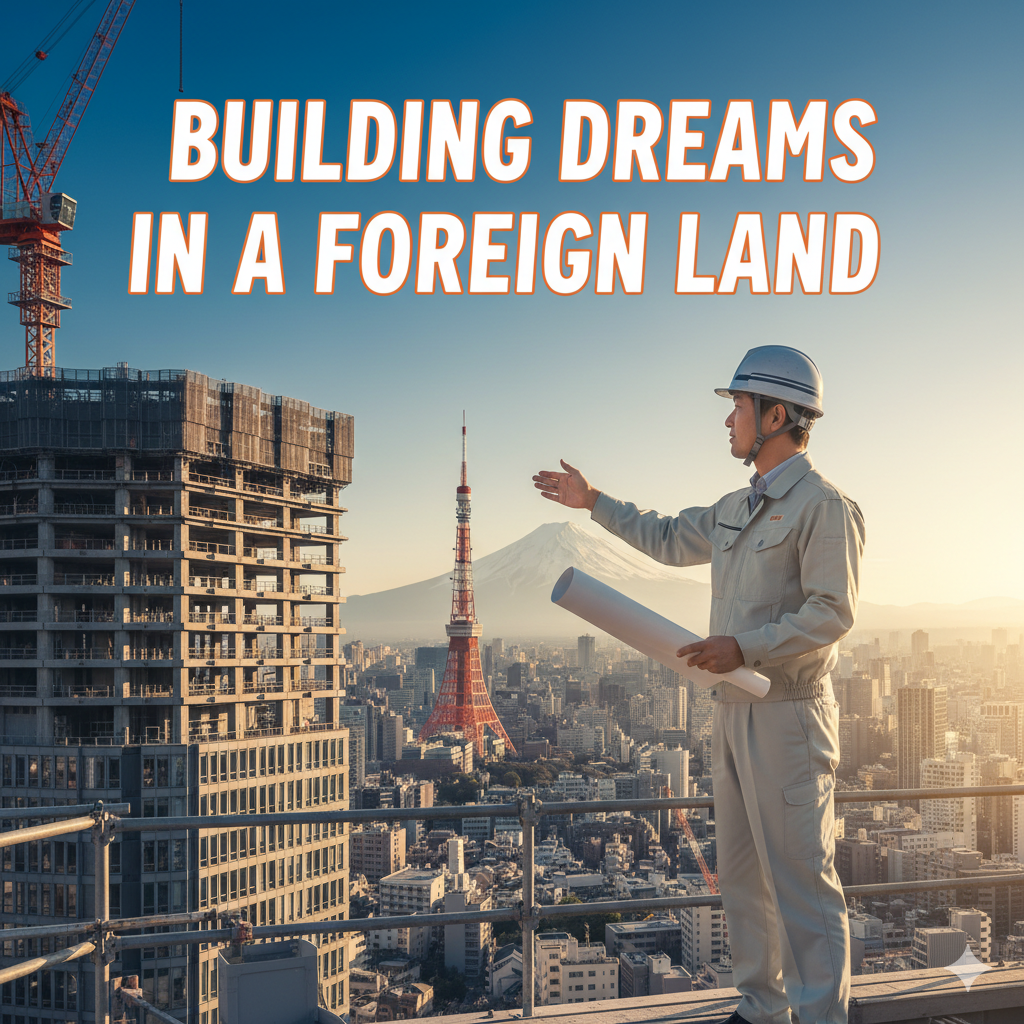The morning sun had just begun to rise over the rice fields of Pangasinan when Eduardo “Eddie” Ramos zipped up his worn-out back pack. His wife, Marites, stood silently by the door, trying to be strong as their two children slept inside. Eddie had been a construction worker in the Philippines for almost a decade, but no matter how hard he worked, his earnings were never enough. When a friend told him about an opportunity to work in Japan as a skilled construction worker, he saw it as his chance to change his family’s future.
The road to Japan wasn’t easy. He had to undergo months of training learning new construction techniques, strict safety standards, and even basic Japanese phrases. The hardest part was leaving his family behind. On the day of his flight, his son gave him a small drawing of their family holding hands. Para hindi mo kami makalimutan, Papa, the boy said softly. Eddie smiled, fighting the lump in his throat. Hindi ko kayo kailanman makakalimutan, he promised.
When Eddie first arrived in Tokyo, everything felt overwhelming. The buildings stretched high into the clouds, trains moved faster than anything he’d ever seen, and the language sounded like music he couldn’t quite understand. His company assigned him to a construction site in Yokohama, where skyscrapers seemed to touch the sky. He was tasked with concrete work mixing, pouring, and finishing under precise conditions.
The first few weeks were physically and mentally exhausting. The Japanese foremen were strict about punctuality, precision, and discipline. Eddie quickly learned that being even a few seconds late was unacceptable. But he admired their work ethic the Japanese valued teamwork and excellence, something that inspired him to improve. Gambatte! his supervisor often said, meaning “Do your best” and so, Eddie did.
At night, he would return to his small apartment, tired but proud. He’d video call his family, showing them the city lights from his window. His wife would tell him stories about the children’s school achievements, and his youngest would show him drawings of tall buildings, just like the ones he was helping build. Papa, when I grow up, I’ll build with you, his son said one night. Eddie’s eyes welled with tears. Yes, anak. Someday, we’ll build together.
Over time, Eddie became one of the most reliable workers on site. He learned how to use advanced Japanese tools and machinery, mastered the art of efficiency, and earned the respect of his supervisors. His fellow Filipino workers became like brothers to him they shared meals, laughter, and sometimes tears. On weekend, they gathered in a small Filipino restaurant in the city, where they ate adobo, sand karaoke, and momentarily forgot their loneliness.
Yet, the life of an OFW was never without sacrifice. There were days when Eddie longed to go home to feel his children’s hugs, to taste his wife’s home – cooked sinigang, to hear the familiar sounds of his neighborhood. He missed birthdays, anniversaries, and family milestones. One time, he cried quietly in the restroom after receiving a message that his mother was hospitalized. he wanted to go home, but his contract wouldn’t allow it yet.
Still, he kept going. Para sa pamilya, he reminded himself every morning before work.
After two years in Japan, Eddie’s hard work started to pay off. He was promoted to team leader, earning a higher salary. He started sending more money home, and soon, Marites told him they had finished paying off their debts. They even started building a small concrete house back in Pangasinan a dream Eddie had carried for years.
Each time he received a photo of the construction progress, he felt a sense of pride. He was building both in Japan and in the Philippines constructing skyscrapers abroad while laying the foundation for his family’s future back home.
One winter morning, as snow began to fall over the construction site, Eddie stood quietly, looking up at the white flakes falling from the sky. It was his first time seeing snow. His Japanese co-worker, Hiroshi, smiled and handed him a warm drink, Sugoi, ne? (beautiful, isn’t it?) he said. Eddie nodded. Yes, beautiful, he replied softly. But in his heart, he was thinking of home the laughter of his children, the warmth of his wife, and the familiar scent of rice fields after rain.
As years passed, Eddie completed several major projects across Japan bridges, office towers, and even a stadium. Each structure stood as a silent reminder of his strength and sacrifice. When his contract finally ended, his employer offered to renew it for another three years. It was a difficult decision. He could stay and earn more, or finally return home to the family he had been away from for so long.
One night, during a video call, his wife told him, Eddie, the children are growing up. They miss you every day. Maybe it’s time you come home. Her words struck deep. He looked at his reflection in the dark window older, stronger, but weary. The next day, he respectfully declined the renewal offer. I’ve built enough buildings, he told his supervisor. Now, it’s time to build my life back home.
When Eddie returned to the Philippines, his family was waiting at the airport, holding a banner that read, “Welcome Home, Papa! He dropped his luggage and ran to them, hugging them tightly as tears streamed down his face. years of distance melted away in that single embrace.
Back home, he used his savings to start a small construction business, employing a few local workers, including some who had returned from overseas like him. He named the business Ramos Builders and promised to create jobs for others so they wouldn’t have to leave their families the way he once did.
In the evenings, he would sit outside their new home, watching his children play. The sound of laughter filled the air the same laughter he had once only heard through phone speakers. he finally felt complete.
Today, Eddie’s story is told among his neighbors as one of perseverance and faith. He proved that even ordinary workers can achieve extraordinary dreams when fueled by love and determination.
“Being an OFW taught me discipline, patience, and gratitude, he often says. But more than that, it taught me what truly matters family.
And as he looks at the sturdy walls of the home he built with his own hands, Eddie knows that the greatest structure he ever constructed wasn’t in Japan it was the life he built for his family, one sacrifice at a time.



